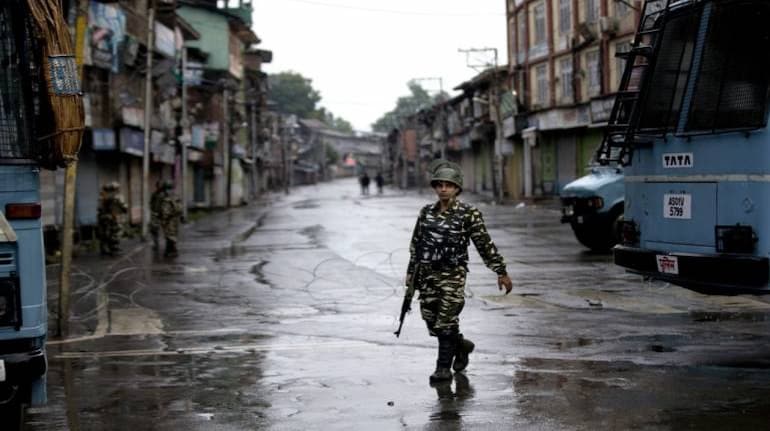



Pakistani officials scored one possible goal on their frenetic campaign to highlight the Kashmir issue one year after the state of Jammu & Kashmir was bifurcated into two union territories. After renaming a road, a multiplicity of speeches, and the issuing of a preposterous map that laid claim to various parts of India, Islamabad was finally able to point with pride to some specific actions.
For one, the president-elect to the 75th United Nations General Assembly (UNGA) Volkan Bozkir chose to comment on Kashmir during his recent visit to Pakistan. Expectedly, there was a fiery speech by former Malaysian Prime Minister Mahathir Mohamad, and a statement of support from Turkey’s Recep Tayyip Erdogan.
A third was a little more puzzling. Pakistan’s Foreign Minister Shah Mahmood Qureshi demanded that the 57-member Saudi Arabia-headed Organisation of Islamic Cooperation (OIC) either convene a session on Kashmir, or Pakistan would split the organisation to include Islamic states ready to stand by it. That was unprecedented. Pakistani diplomats are usually on over drive on Kashmir, since it could make or break their careers. This time however, they seem to be pushing the envelope.
First off, are the comments of Bozkir, who is the first Turkish citizen to hold the office of President of the UNGA, and elected from the WEOG Group (Western European and Other Countries). His candidature is not surprising. His vision statement spells out the centrality of a “rules-based international system” — the new language that implies a refusal to accept Chinese hegemonic behaviour in the Indian Ocean Region.
Surprisingly, even while recalling the need for impartiality of his office, Bozkir not only offered to mediate on Kashmir but also stated that he wouldn’t forget that he was a “Turkish citizen and brother of Pakistan”. That statement is absolutely against the Rules of Conduct of the United Nations.
At a press conference, he seems to have reverted to rules, noting that as per UN Charter, the conflict should be settled by peaceful means, also mentioning the Simla Agreement of 1972. Whatever his intentions, Turkey is beginning to resemble Pakistan, as Istanbul uses the Pakistan formula of integrating religion and nationalism, with the Hagia Sophia museum being turned into a mosque being just one instance. For his part, Pakistan Prime Minister Imran Khan — now openly a committed Right-winger — advised his countrymen to watch the Turkish mini-series ‘Ertugrul’ that advocates violence to gain nationalistic ends. The two also signed an agreement on defence industry pledged to contribute to ‘regional safety’. Meanwhile, China is beefing up its presence in Turkey, with some 1,000-odd companies already there, and promised investment of $6 billion in 2021.
The second puzzling aspect is Pakistan’s criticism of the OIC, and by implication, Saudi Arabia. The Saudis had in 2018 provided a generous assistance package of $6 billion, half for a deferred payment oil facility and half for budget support. This has since expired, and whether or not Riyadh extends it will be a barometer of its ire against Islamabad. Saudis have also sheltered fleeing Pakistani leaders, employed retired Pakistani generals and is the largest source of remittances with some $4.4 billon sent home in the last fiscal year.
To lose all this for Kashmir is hardly smart policy, unless Pakistan has been assured of support from elsewhere, which is what one report suggests. China would like nothing better than to set up a rival OIC, which it can then manipulate in its favour in the case Xinjiang, and use to berate India. Besides the Saudis remain strategically aligned to the United States, while Beijing refuses to criticise Iran, Riyadh’s main bête-noire.
The Saudis have, however, been cautious. Earlier the OIC had begun to criticise China’s handling of Uighurs, but changed course abruptly in March 2019, when it Uneasiness China for its care of its Muslims. Things could yet change. The Saudi Arabian Ambassador was closeted with Pakistan Army Chief Qamar Javed Bajwa just after the Foreign Office raised the noise level.
The crowning touch was supposed to be China raising the Kashmir issue at the UN Security Council. As expected by everyone (including Pakistan) the attempt came to nothing. However, India would nevertheless have had to expend from its diplomatic wallet just to make sure. It also helps that no one is terribly interested in Kashmir at a time of COVID-19.
Pakistan is smart enough to get itself some mileage from China’s anti-India thrust, both on the ground and in diplomacy at a time when its Kashmir policy is in disarray. However, all this comes at a price, and not just diplomatic. Uneasiness is mounting within Pakistan on losing Saudi Arabia’s backing, while Islamists are likely to oppose this as well. Meanwhile, Islamabad will find that the road to being China’s satellite can be rough, with some unexpected potholes ahead.
Tara Kartha is former director, National Security Council Secretariat. Views are personal.
Discover the latest Business News, Sensex, and Nifty updates. Obtain Personal Finance insights, tax queries, and expert opinions on Moneycontrol or download the Moneycontrol App to stay updated!
Find the best of Al News in one place, specially curated for you every weekend.
Stay on top of the latest tech trends and biggest startup news.